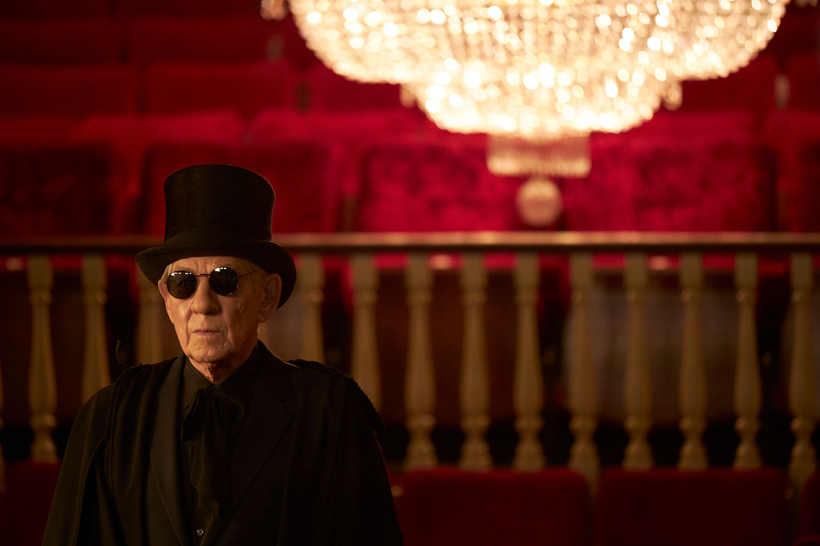In 1971, two decades before being knighted, the 31-year-old Ian McKellen “did his Hamlet” (as they say) with the itinerant Prospect Theatre Company. “I’m always doubtful when an actor is dubbed, ‘The Hamlet of his generation,’” he wrote in 2020, “particularly as no one ever wrote it about mine!” In the summer of 2021, as the pandemic wore on, the now octogenarian Sir Ian took another shot, this time at the 633-seat Theatre Royal, Windsor. Sean Mathias directed the live event and then adapted it as a movie, with action spilling all through the house’s public and backstage spaces, leaving no zone unexplored. The Guardian’s veteran drama critic Michael Billington judged the cinematic version superior; that’s the one that’s on deck today.
Over the decades, the commercial appeal of Hamlets on video has varied hugely. Since 1948, Laurence Olivier’s black-and-white Gothic classic has earned $7 million. Released in 1990, five years ahead of Braveheart, the Mel Gibson swashbuckler directed by Franco Zeffirelli took in a cool $21 million. In 1996, Kenneth Branagh, who (like Olivier) both starred and directed, cleared $6.3 million. Ian McKellen: Hamlet, which opened in U.K. theaters on February 27 of this year for a strictly limited engagement, has seen receipts of $222,812. Pin money. Still, for Hamlet buffs, this one is catnip.

“A time of disruption… ” says the title card at the top of the movie. “The theatres are closed indefinitely.” The Theatre Royal, Windsor, for example, hulking like a relic from the age of Charles Dickens. On a curb across the street, a codger in beret and cable-knit cardigan—McKellen in Samuel Beckett mode—casts a world-wary eye up to nothing much in the sky. Who’s there, on the fire escape?
Inside, now natty in a stovepipe hat, hands neatly folded, eyes blanked out behind a blind man’s glasses, our codger hangs fire as Jeremy Hyde’s fratricidal, newly-crowned King Claudius addresses his court in buttery, conversational tones that define the film’s soft-spoken Chekhovian style. Cuts to Shakespeare’s sprawling text are radical yet artful, bringing the running time down to two taut hours. Adam Cork’s spare Celtic score papers over the gaps.

Even as Mathias asks us to look past McKellen’s age, as well as other players’ race or gender, he takes a hard line on semantics. For once, Hamlet’s famous “advice to the players” (“Speak the speech, I pray you”) isn’t all-purpose blah-blah but a specific note regarding specific lines from Hamlet’s own poison pen—Mathias even clues us in to which ones they are. Where other Hamlets revel in rhetorical flourishes, McKellen dwells in disillusionment, drilling down to bedrock meaning.
As so often, the soul of this Hamlet lies in serendipitous incongruities. Alis Wyn Davies’s flower child of an Ophelia lends her mad scenes stray notes of Linda Ronstadt and Liza Minelli. Jenny Seagrove’s Vogue-ready Gertrude affects a Danish singsong that paradoxically marks the queen as a stranger in her own land. The place Hamlet holds in his heart of hearts for Ben Allen’s monastic Horatio seems big enough for Lee Knight’s affectionate Rosencrantz, too. For shocks, there’s Steven Berkoff’s apoplectic Polonius. Blink and you’ll miss a baroque pantomime like a glimpse of Bernini seraphim.
Ian McKellen’s Hamlet, directed by Sean Mathias, is available for streaming on MarqueeTV
Matthew Gurewitsch writes about opera and classical music for AIR MAIL. He lives in Hawaii

